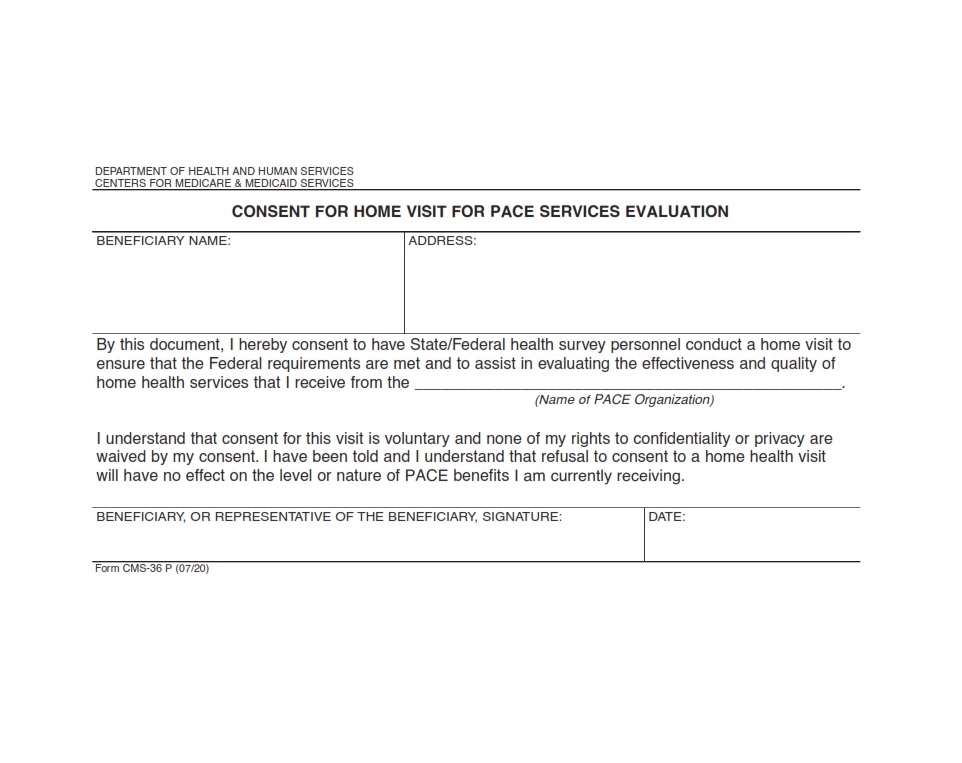CMSFORM.ORG – CMS 36P – CONSENT FOR HOME VISIT FOR PACE SERVICES EVALUATION – Imagine the convenience of healthcare services brought right to your doorstep, tailored to meet your specific needs and preferences. This innovative approach is precisely what the CMS 36P form signifies – a consent for a home visit as part of the evaluation process for PACE (Programs of All-Inclusive Care for the Elderly) services. In today’s fast-paced world, where time is a precious commodity and access to quality care can sometimes be challenging, the concept of receiving comprehensive medical evaluations in the comfort and familiarity of one’s home is not only groundbreaking but also indicative of a shift towards patient-centric healthcare models. Join us as we delve into the intricacies of this unique consent form and explore how it symbolizes a more personalized and convenient approach to evaluating and delivering essential healthcare services to our elderly population.
Download CMS 36P – CONSENT FOR HOME VISIT FOR PACE SERVICES EVALUATION
| Form Number | CMS 36P |
| Form Title | CONSENT FOR HOME VISIT FOR PACE SERVICES EVALUATION |
| Published | 2002-07-01 |
| O.M.B. | – |
| File Size | 485 KB |
What is a CMS 36P?
A CMS 36P form is a crucial document that serves as the consent for a home visit for PACE (Program of All-Inclusive Care for the Elderly) services evaluation. This form allows healthcare professionals to conduct an in-depth assessment of an individual’s health, living conditions, and overall well-being in the comfort of their own home. By obtaining consent through the CMS 36P, providers can tailor their services to meet the specific needs and preferences of each participant.
A home visit facilitated by CMS 36P can offer a more holistic approach to evaluating an individual’s eligibility and suitability for PACE services. It provides healthcare teams with a firsthand look into the daily life of participants, allowing them to better understand their unique circumstances and develop personalized care plans. The insights gained from these home visits not only help in determining the most appropriate level of care but also foster a deeper connection between providers and participants, leading to improved outcomes and greater satisfaction with PACE services.
Where Can I Find a CMS 36P?
If you’re in search of a CMS 36P form for obtaining consent for a home visit for PACE services evaluation, you have several avenues to explore to locate this vital document. A good starting point is reaching out directly to the Program of All-Inclusive Care for the Elderly (PACE) provider in your area. They should be able to provide you with the required paperwork or direct you on where to obtain it. Additionally, many state health department websites offer downloadable versions of various CMS forms, including the CMS 36P.
Another useful resource for locating the CMS 36P form is through online repositories and databases specializing in healthcare-related documentation. Sites like Medicare.gov or even reputable medical supply companies often have easily accessible forms available for download. Remember that timely access to accurate paperwork such as the CMS 36P is crucial when seeking consent for PACE services evaluation, so don’t hesitate to utilize all available resources at your disposal.
CMS 36P – CONSENT FOR HOME VISIT FOR PACE SERVICES EVALUATION
The CMS 36P form, which grants consent for a home visit for PACE services evaluation, represents a crucial step in ensuring comprehensive care for individuals requiring specialized support. This process not only promotes personalized assessments but also underscores the importance of tailored healthcare solutions that meet the unique needs of each individual. By facilitating home visits, PACE providers can gain valuable insights into the living conditions and daily challenges faced by participants, ultimately leading to more effective and compassionate care delivery.
Furthermore, the consent for a home visit serves as a gateway to establishing trust and fostering meaningful relationships between participants and healthcare providers. It allows for a deeper understanding of the social determinants affecting an individual’s health and well-being, enabling PACE teams to develop holistic care plans that address both physical and psychosocial needs. Embracing this collaborative approach can result in enhanced outcomes and improved quality of life for those receiving PACE services, highlighting the profound impact of personalized, community-based care initiatives.
In essence, the CMS 36P form symbolizes a commitment to person-centered care that empowers individuals to take an active role in their health journey while benefiting from comprehensive support tailored to their unique circumstances. By embracing this model of care delivery through home visits and detailed evaluations, PACE programs can truly make a difference in the lives of participants by promoting dignity, autonomy, and well-being at every stage of their healthcare experience.
